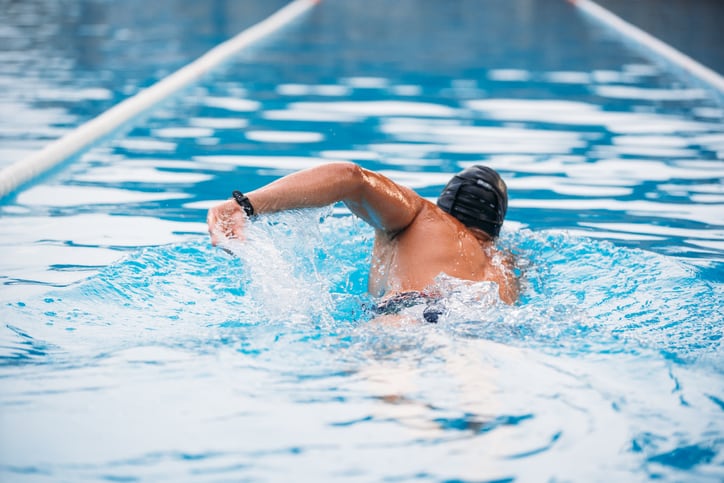Key take-aways
- A new RCT including 60 male professional sprint swimmers assessed whether combining probiotics and omega-3s with ultra-short race pace training (USRPT) improved sprint swimming performance.
- Results showed that combining probiotics and omega-3s with training led to greater improvements in several performance measures.
- The probiotic blend was suggested to reduce inflammation and fatigue, enhance immune function and preserve lean muscle mass.
- The omega-3 supplement was suggested to stimulate muscle protein synthesis, reduce muscle breakdown, improve mitochondrial efficiency and increase gut microbial diversity in a prebiotic-like effect.
- The researchers conclude that aligning nutrition with training can significantly enhance athletic performance.
Researchers in Iran, Japan and the US investigated whether combining probiotics and omega-3 supplementation combined with ultra-short race pace training (USRPT) could enhance sprint performance, anaerobic power and recovery.
The new randomized, double-blind, placebo-controlled trial sought to address a research gap, with results highlighting the potential of specific nutrient intake for enhanced sports performance.
“Findings emphasize the importance of aligning training with nutrition to support optimal performance,” they wrote in the journal Nutrients.
“This integrated approach may provide a practical strategy for competitive swimmers seeking to optimize their performance.”
Why is gut health important for exercise?
Gut health is understood as a key area to target as a way to boost sports performance as the gut microbiota is understood to help absorb nutrients and regulate immunity.
Some probiotics like Lactiplantibacillus plantarum have been found to support gut barrier function, enhance nutrient absorption, reduce inflammation, and improve immune responses, and research has suggested they can be particularly effective when it comes to supporting intense athletic training. Previous research has also shown that such probiotics may also help delay fatigue and aid lactate processing, which could potentially improve anaerobic capacity in swimmers.
The researchers note that omega-3 fatty acids including eicosapentaenoic acid (EPA) and docosahexaenoic acid (DHA) may also support athletes as they are known to reduce inflammation, support cardiovascular and muscle health, and may also enhance muscle protein synthesis, according to research.
And while findings on performance effects remain mixed, omega-3s have also been found to increase gut microbial diversity by displaying prebiotic-like effects. Therefore the researchers of the new study proposed that combining omega-3s with probiotics may create a synbiotic effect by improving gut health, inflammation control, recovery, and increase swimmers’ speed.
Swimming performance in elite male athletes
The researchers recruited 60 male professional sprint swimmers to participate, all of whom trained six times weekly and had championship backgrounds.
They divided them into six groups including a control group, a training-only group, and combinations of probiotics and omega-3 supplementation.
The omega-3 supplement contained 500 mg of EPA and 180 mg of DHA, and the probiotic supplement contained eight bacterial strains: L. plantarum, L. casei, L. acidophilus, L. bulgaricus, Bifidobacterium infantis, B. longum, B. breve and Streptococcus thermophilus.
The participants followed eight weeks of the USRPT exercise plan, and were assessed on various areas of performance which included: swimming performance; propulsion metrics; anaerobic capacity; strength and power; agility and reaction; and body composition. Pre- and post-tests scheduled eight weeks apart assessed physical performance.
After eight weeks the results showed that combining probiotics and omega-3 supplementation with USRPT significantly improved swimming performance, particularly sprint speed, anaerobic power and agility.
“This study suggests that combining probiotics and omega-3 supplementation with USRPT leads to synergistic improvements in sprint swimming performance, enhancing anaerobic power and recovery beyond what is achieved with individual interventions,” the researchers concluded.
They did however add that future research should include female athletes as well as a longer intervention period, biomarker analysis and microbial tracking to better understand the full potential of the interventions.
Impacting inflammation, immune function and gut health
The researchers suggested that probiotic blend was likely to improve several measurements which were likely the reason for post-exercise recovery and reduced fatigue. As specific strains, such as L. plantarum and B. longum, have been shown to help reduce inflammation, enhance immune modulation, and stabilize gut microbiota, the researchers wrote that these mechanisms likely contributed to the observed benefits.
The swimmers in the combined supplementation group experienced increased muscle mass and reduced body fat, which the authors attribute to the recorded performance improvements. While these results correlate with established research that elite swimmers tend to have favorable body composition profiles, the authors suggest that the probiotics may have helped preserve lean mass and promote muscle recovery.
They also noted that the omega-3 fatty acids likely enhanced performance by stimulating muscle protein synthesis, suppressing muscle breakdown and promoting mitochondrial efficiency.
While USRPT alone was found to improve cardiovascular efficiency, anaerobic capacity and neuromuscular performance, the combination of USRPT with omega-3 and probiotic supplementation produced the most substantial improvements in sprint times and power outputs.
Finally, the combined intervention was found to produce stronger effects than either supplement alone, suggesting a synergistic benefit for training adaptations and recovery.
As co-author and contributing researcher Dr. Ralf Jäger told NutraIngredients, the synergistic effects may not have necessarily been predicted, but they can be supported by solid scientific rationale.
“Athletes often take multiple supplements to support their health and performance. However, studies that directly compare the combined effects of ingredients versus their individual effects are rare. Sometimes, combinations show no additional benefit (e.g., when mechanisms of action overlap); sometimes they show additive effects; sometimes the benefits cancel each other out, and only rarely do they result in true synergy.
“Our study employed a six-arm design, which allowed us to assess the effects of each component individually and in combination, control, exercise alone, exercise plus individual ingredients, and exercise plus the combined ingredients. Only with such a comprehensive design can we truly determine both individual and synergistic benefits.”
Authors: Maymandinejad, I. et al; Source: Nutrients 2025, 17(14), 2296; https://doi.org/10.3390/nu17142296; “Synergistic Effects of Probiotic and Omega-3 Supplementation with Ultra-Short Race Pace Training on Sprint Swimming Performance.” Authors: Maymandinejad, I. et al.



